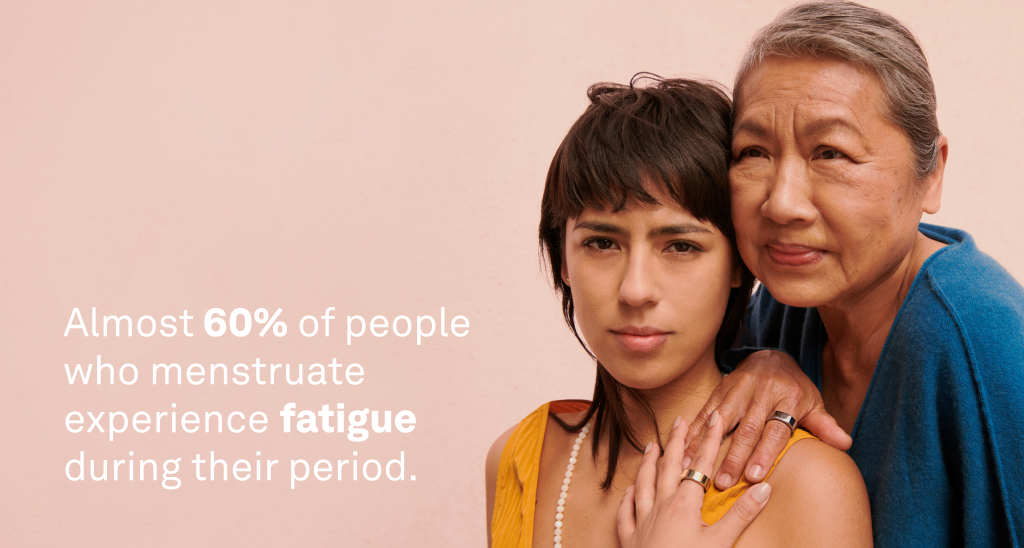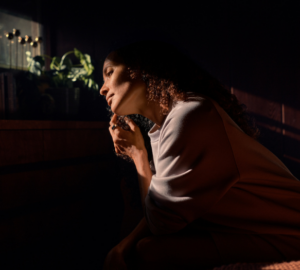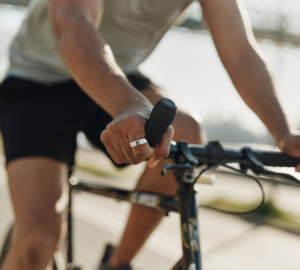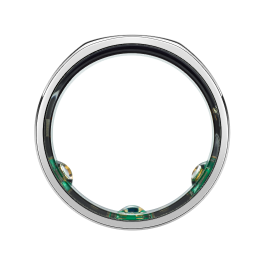For many people who menstruate, you may ask yourself “Why am I so tired on my period?” during that time of the month. Throughout your menstrual cycle, your hormones naturally fluctuate, which means there are some days you feel ready to conquer the world and others when you just want to hide under a blanket with a hot water bottle.
A 2022 study of premenstrual symptoms found that almost 60% of menstruators experience fatigue during their period — making it one of the most common premenstrual symptoms after food cravings and mood swings. Period fatigue can affect daily life, lower performance at work, and can reduce the desire to participate in social activities. Yet in our always-on society, functioning at a high-energy level isn’t always so easy for people who menstruate.
At Oura, we are committed to empowering people with menstrual cycles to make more informed decisions about their reproductive health. One way that Oura members can do this is by activating our Cycle Insights feature. Understanding your menstrual cycle can help you prioritize your sleep and other habits that help reduce fatigue, not only during your period but overall as well. For those who track their period with Oura, your insight messages are tailored to focus on balancing activity and recovery depending on where you are in your cycle.

Period Fatigue: Normal, but Not Talked About Enough
“For too long we have modeled human performance in a linear manner, such that we believe that we wake up, and continue successive levels of productivity until we go home, crawl into the sheets, and (hopefully) fall asleep,” says Rebecca Robbins, PhD, sleep researcher and Oura advisor.
“The truth is that so many processes in our bodies and brains operate in very rhythmic ways, with certain times when we are wired to achieve and succeed, and others when we vitally need rest. There is strong evidence to show that fatigue ebbs and flows over the course of the menstrual cycle.”
Although feeling tired and sluggish during your period is normal — and typically not a cause for concern — there are ways to up your energy during this point in your cycle.
Below, find 5 potential reasons, plus science-based solutions, for combatting fatigue during your period.
RELATED: Tired but Can’t Sleep? Here Are 5 Possible Reasons Why
Why Am I So Tired On My Period?
Every body is different, so there are no universal causes of period fatigue. However, there are a handful of factors behind most cases of menstrual fatigue. Once you know what these common culprits are, you can assess your lifestyle and habits and identify tweaks that might help address them.
1. Fluctuations in Hormone Levels
Your hormones fluctuate throughout the entire menstrual cycle — and they affect your entire body. As your body prepares to menstruate, the levels of estrogen and progesterone change.
After ovulation, estrogen levels drop while progesterone levels rise. Estrogen levels then start to increase once again before both hormones crash around two to four days before menstruation — taking your energy levels with them.
Low estrogen and progesterone levels prevent your body from effectively releasing melatonin — the sleep-inducing hormone. Without enough melatonin, you may find it harder to fall and stay asleep, leaving you fatigued.
Serotonin is a neurotransmitter that regulates not only mood and energy levels but also estrogen synthesis. However, this also starts to drop off during the second half of your cycle, contributing to lower mood and energy levels.
These hormonal changes are largely responsible for the collection of symptoms known as premenstrual syndrome (PMS).
2. Period Pain
Period pain is one of the most common physical symptoms of PMS. It includes abdominal cramps, lower back pain, headaches, and uncomfortable bloating — all of which make it harder to relax or get a restful night’s sleep. Period pain can, therefore, contribute to sleep debt, making you feel more tired during the day.
3. Low Iron Levels
In some cases, heavy menstrual bleeding (HMB) can cause iron deficiency and anemia. Without enough iron, your body can’t produce hemoglobin, an iron-rich protein that the red blood cells use to transfer oxygen to the cells in the body.
Oxygen is essential to your energy and vitality, which is why low iron levels can cause period fatigue.
4. Circadian Misalignment
Hormonal changes throughout your cycle dictate your natural circadian rhythms. However, many of us lead lives that don’t respect these rhythms. We might stay up late at night for many reasons, including work, caring for children, watching TV, or even partying.
The effects of circadian rhythm disruption on sleep and the menstrual cycle are particularly pronounced in shift workers — highlighting the importance of respecting your circadian rhythm as much as possible.
5. Food Cravings
Feel like your sweet tooth and carb cravings kick into high gear around your period? Blame it on your hormones. Research shows that fluctuating levels of the hormones estrogen and progesterone cause these cravings around your period.
While there’s nothing wrong with indulging in a few extra snacks during your period, reaching for sugary, starchy, and highly processed foods can lead to blood glucose spikes — followed by an energy crash.
RELATED: How Late-Night Meals Affect Your Sleep
6 Ways to Treat Period Fatigue
Fortunately, period fatigue is nothing serious in most cases, and you can manage and even reduce it by making some of the following lifestyle tweaks.
1. Try Some Gentle Movement
You might not feel like hitting the gym before or during your period, but research indicates that moderate aerobic exercise can help boost premenstrual energy levels.
Oura members who are using Cycle Insights can also access a new set of personalized Readiness insights tailored to where you are in your cycle. In other words: You’ll see more accurate and actionable guidance for balancing activity and recovery depending on different points in your monthly cycle.
Oura Ring also integrates with the Wild.AI app, so if you train according to your cycle, you can import your data from Oura to appear in your Wild.AI morning check-ins.

2. Get Some Rest
That said, it’s also important to listen to your body and get some rest when you feel you need it. After all, constant activity and circadian misalignment can both contribute to period fatigue.
Taking time for rest can be just what your body needs before or during your period, so don’t feel guilty for saying no to unnecessary social plans or taking on extra duties at work.
Resting or taking a nap when your body needs it will do more for your health, social life, and productivity than pushing your body beyond its limits.
If you’re an Oura member, Rest Mode is perfect for when you want to focus on rest and recovery over activity. It adjusts your Sleep and Readiness insights while temporarily snoozing your Activity Score — allowing you to focus on rest.
3. Support Your Sleep
According to the Sleep Foundation, roughly seven out of ten people who menstruate say their sleep changes around three to six days before their period. Following general guidelines for better sleep, including reducing caffeine and alcohol, getting sun exposure, and staying active during the day.
Additionally, awareness is key, says Dr. Robbins: “If you find yourself maintaining your sleep duration and Readiness Scores across your menstrual cycle, but you’re still feeling sluggish or fatigued, add a bit more time to your sleep schedule these days and emphasize wind-down routines to soothe you to sleep.”
4. Maintain a Balanced Diet
One study found that following a Mediterranean diet — which comprises a variety of vegetables, fruits, and healthy fats — shortens the menstrual cycle.
Aim to eat a wide variety of vegetables, proteins, complex carbohydrates, and healthy fats to ensure your body has all the nutrients it needs for optimal functioning at any time of the month.

5. Stay Hydrated
Drinking enough water is essential for optimum health throughout your cycle — but it’s even more important when you’re on your period. One study found that drinking plenty of water can reduce bleeding duration and pain intensity.
Another study found that increasing water intake can improve both sleep and mood during your period.
6. Try Some Relaxation Techniques
Meditation, breathing exercises, massages, and acupuncture are just a handful of examples of ways to relax. But it’s up to you — anything that can help you wind down before bed and enjoy a deeper night’s sleep is an ideal relaxation technique.
Oura members can access relaxing meditations, breathwork exercises, and other relaxation techniques in the Explore content in the Oura App.
RELATED: 5 Simple Breathing Techniques for a Good Night’s Sleep
When to See a Healthcare Professional
If you have particularly heavy periods or experience severe fatigue, it may be worth seeking medical advice from a healthcare professional. You could have iron-deficiency anemia or another underlying medical problem. Even if you don’t have heavy periods but still struggle with severe period symptoms, a healthcare provider could prescribe treatments to lessen the symptoms.
About the Oura Expert
Rebecca Robbins, Ph.D., is an Instructor in Medicine at Harvard Medical School and an Associate Scientist at the Brigham and Women’s Hospital. Her research uses marketing and novel communication tools and technologies (i.e. smartphones and other mobile devices) to design persuasive behavior change interventions to improve sleep and circadian health. In 2011, Dr. Robbins co-authored Sleep for Success! with Dr. James B. Maas. Dr. Robbins’ research has appeared in the New York Times, the Financial Times, and Readers’ Digest, and she has appeared on The Today Show, Live! With Kelly Ripa and Ryan Seacrest, Fox Business News, ABC Nightline, CNBC, and CBS This Morning.





